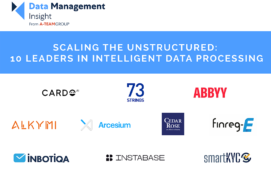It is no longer enough to take a point-in-time approach to each financial regulation as it emerges. Rather, firms must adopt coherent data management strategies if they are to fulfil all compliance requirements and create competitive advantage from investing in meeting regulations.
That’s the message from Davide Ferrara, partner in retail and wholesale banking, financial services consulting, at CSC.
Speaking at this week’s Regulatory Reform and the Data Conundrum Conference 2012 hosted by the International Centre for Financial Regulation and Intellect, Ferrara said fines of $5.7 billion against US and UK firms last year meant compliance is not an option.
Similarly, banks cannot afford to stand still and must move forward using regulatory change as a way to rewire the financial system. This, said Ferrara, would result from institutions getting return on investment from data management projects.
In a presentation entitled ‘Transforming regulatory challenges into competitive advantage’, Ferrara cited the Foreign Account Tax Compliance Act (Fatca) as the tip of an iceberg in data management.
Ferrara pointed out that Fatca – which requires US taxpayers holding financial assets outside the US to report those assets to the Internal Revenue Service (IRS) and foreign financial institutions to report directly to the IRS certain information about financial accounts held by US taxpayers – is not too difficult to comply with.
But, he said: “The issue is that Fatca will be the first of many Fatcas as other governments look to generate revenue. There could be UK, German, French, Spanish and Portuguese Fatcas and more. All these countries are discussing these sorts of regulation. Banks need to approach Fatca with a strategy that will enable them to build in compliance with any other regulation. When each country adds a Fatca regulation, the need will be for a coherent information management strategy, not continuous cost over time.”
Considering data management strategy, Ferrara noted the need to assess the current situation, make sure executives across the organisation are behind the strategy and address the problem of data silos that provide little support for long-term requirements.
On the benefits and deliverables of a cohesive data management strategy, he said: “Looking at data management propositions at numerous institutions suggests the cost reduction factor could reach up to 60% on an ongoing basis, and that’s just the regulation and compliance piece. It’s got to be done, so get it done early and monitor the benefits, some of which can be monetised while fines can be avoided.”
Subscribe to our newsletter




